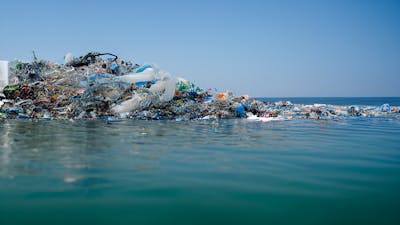- Accelerated evolution of plastic-degrading microbes in a laboratory environment
- Engineered plastic-eating microbes that degrade multiple types of plastic safely and with high efficiency
- Can be globally deployed to mitigate environmental plastic pollution and reduce plastic waste

Plastivores: Plastic-Degrading Super-Microbes and Enzymes
Plastic-eating microbes and enzymes capable of degrading multiple types of plastics could help reduce global plastic waste and mitigate pollution
Want to collaborate?
We seek to create unique collaborations with academic institutions, industry, investors, foundations, and philanthropists who share our vision of bridging the divide between breakthrough scientific discovery and commercial impact.
Synthetic Biology
Breaking, a plastic degradation and synthetic biology company, launched based on a core discovery made at the Wyss Institute of a microbe that can break down plastic waste.
The Problem

More than 360 million tons of plastic waste are generated around the world every year, presenting a global threat to our environment and human health. There is presently little or no way for ecosystems to decompose most commercial plastics, with more than 75% of waste plastic remaining either in landfills, soils, or in the oceans for decades. Plastics increasingly contaminate all environments and living organisms, and pose serious risks that scientists are only beginning to understand, but that will have long-lasting detrimental impact on the planet.
Our Solution
We are identifying microbes from natural sources, and evolving their pre-existing ability to survive on plastics as their sole food source to degrade and decompose them into relatively harmless and ubiquitous substances: carbon dioxide, water, and decayed biomass.
The first step in this process is the “bio-prospecting” of natural environments to isolate and study microbial strains that are able to decompose and bio-assimilate multiple types of plastic into harmless substances. With the help of analytical chemistry and next-generation sequencing, the microbes’ plastic-metabolizing enzymes and pathways are characterized. Then, using the microbes’ baseline capabilities as a foundation, synthetic biological techniques including gene-specific and genome-wide engineering tools are applied to accelerate the evolution of faster and more robust plastic-eating microbes. Such metabolically empowered microbes could be globally deployed to decompose waste plastics, and help deal with the plastics crisis where other technologies are unable to or do not exist yet.
Product Journey

The plastic degradation project is a collaboration between the groups of Donald Ingber and George Church at the Wyss Institute, and led by Vaskar Gnyawali and Sukanya Punthambaker. Before the present plastic degradation project began to take shape, Ingber and former Wyss Senior Staff Engineer Richard Novak together with other researchers on Ingber’s team, including Gnyawali, Elizabeth Calamari, and Manuel Ramses Martinez Flores, had collaborated with artist Lynn Hershman Leeson to create a science-art installation named “Twisted Gravity.” The joint vision, driven by concern for a sustainable planetary future, combined the Wyss’ proven HydroPEF technology, which kills microbes in water to make it drinkable, and a second component containing naturally occurring microbes with low-level capacity to eliminate PET plastic from water. First shown in the Gwangju Biennial in South Korea and the New Museum in New York City, the installation is continuing its journey around the world. Gnyawali took on the formidable challenge of developing much more powerful microbes that can effectively degrade multiple types of plastics and initiated a “bioprospecting” effort. Soon, he teamed up with Punthambaker who added the Church group’s synthetic biology expertise to the project.
The innovative approach and potential of the plastic degradation project was recognized in a 2021 Wyss Validation Project and was renewed for a second year of funding in 2022, which also enabled the team to include the analytical chemistry expertise from Alexander Pauer, a Materials Characterization Core Manager at the Wyss. In addition to the Validation Project’s financial and technical support, Wyss Business Development Manager Bill Bedell, who advised numerous life science companies before joining the Wyss, is guiding the team while they develop the technology toward commercialization.
Want to collaborate?
We seek to create unique collaborations with academic institutions, industry, investors, foundations, and philanthropists who share our vision of bridging the divide between breakthrough scientific discovery and commercial impact.
Want to collaborate?
We seek to create unique collaborations with academic institutions, industry, investors, foundations, and philanthropists who share our vision of bridging the divide between breakthrough scientific discovery and commercial impact.